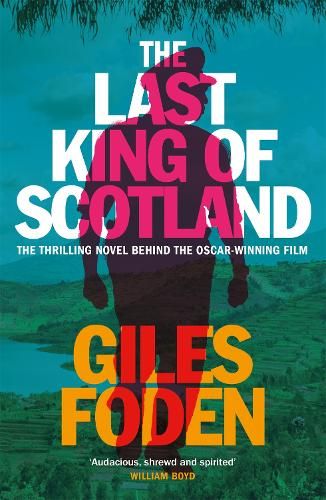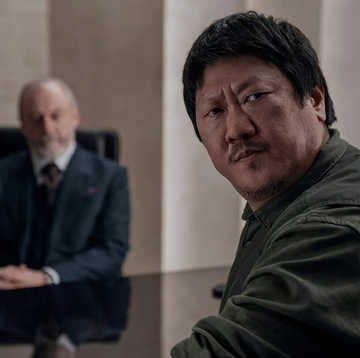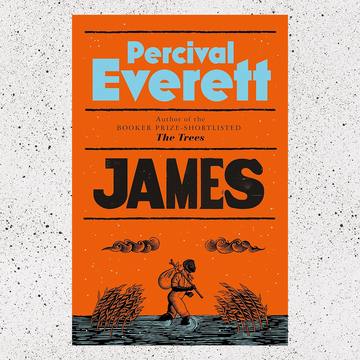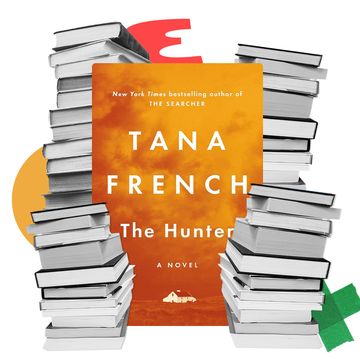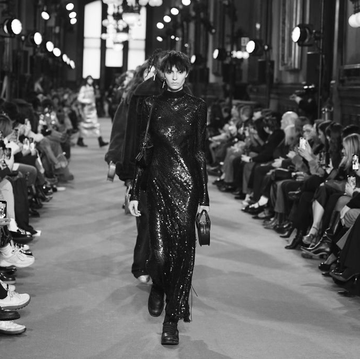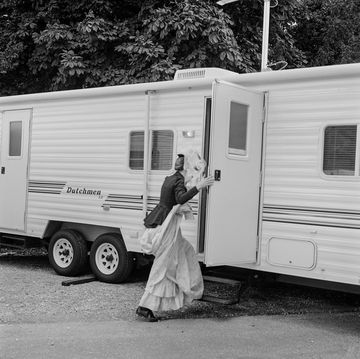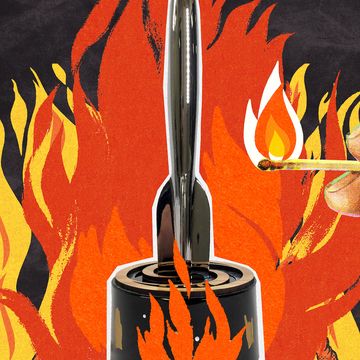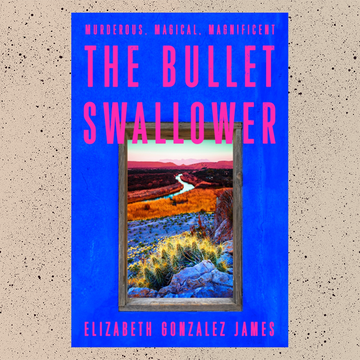When Captain Xin’s Jeep pulled up outside Alice’s bungalow, at the time his messenger had specified, it was followed by a diesel-chugging truck. In the back of this: six of his soldiers, along with some water, tents, fuel and other provisions for the journey. Xin knocked on the door.
Alice emerged, carrying a small rucksack containing her maps and a few necessaries. She felt excited at the prospect of the trip— something happening at last, after the mixture of torpor and fruitless encounters with South African and Chinese authorities that her time on the island had so far brought. After months of asking, Xin had at last, with an expression she couldn’t quite read, agreed to help her.
She walked alongside him to the Jeep. He was wearing the same light-brown uniform as that first night they met at the hotel in the old Portuguese fort, when she’d been with the NGO just a few weeks and was still keen to prove something — to herself or to them, she wasn’t sure. She had guessed it was him right away, there in the bar, smoking a cigarette and drinking a glass of whisky, with his broad forehead and closely cropped hair, face a little squashed down by worry, it seemed to her. He was younger than she had expected, a few years older than her maybe, and handsome, too. He’d known at once what she wanted from him — a pass into the interior. It was the same thing everyone wanted from him. “There’s no point in my granting it,” he had told her, not unkindly. “You’re bound to fail. All will fail.”
Now he had sunglasses on his forehead and a white silk scarf wrapped round his neck. It made him look a little raffish, even out here. Had he worn it for her, she wondered? He requested the co-ordinates she had for the aquifer. She gave him them, saying, “Thanks a million”, though they both knew their chances of finding the fabled water source — the subterranean layer of water-bearing rock that might change the fate of this so-called desert island, off the East African coast, depending on which of the competing authorities would be the first to find it — were slim.
Their small convoy crept out the city, along dusty roads, then a dried riverbed. A walkie-talkie and a canteen of water rolled about in a trough between her and Xin.
Piles of dry brushwood crackled under the Jeep’s tyres. There was no wind today: even the breeze produced by the passage of the vehicle itself was stifling. The plastic covering on the aerial of Xin’s walkie-talkie seemed to be melting.
As they passed some thorn trees on a bank of dry grass, at which goats were nibbling, the billy raised its head to stare at them. She suddenly became strongly aware how little she knew Xin, despite the many evenings they had spent together in the bar of the old fort. Evenings when she’d told him about her life in Ireland, where she’d tried so hard at school, and studied for a degree in water science in Dublin, not as far away from her parents in Kerry as she’d have liked, and how she was surprised when the staggered shadows thrown by clouds passing at intervals over the island made her homesick. Evenings when he’d told her about his life in Macau, where his grandmother was a senior figure in politics and he, as a result of the adjacent privileges her position brought, became something of a wastrel: a drunk, a gambler, a driver of fast red cars. He’d wanted to be a pop star, he’d told her, with a grin that showed his teeth, slightly pointed, but he couldn’t sing. The fun ended when his grandmother fell into disgrace, and then he joined the army.
They came to a spit of land where dry grass had caught fire, then been choked off by sand, leaving a small area of black stubble, in some parts still smouldering. Soon the riverbed petered out and they entered the desolation of the dunes proper, the two vehicles climbing up and falling down the yellow immensities like insects.
At one point, mounting another vast pile of sand, the truck behind got stuck. Xin picked up his walkie-talkie and spoke into it.
They waited outside as the soldiers dug the vehicle out, cigarettes jutting from mouths as they angled in spades and strutted metal boards, rolled wire netting up the incline. It took over an hour.
“Drift-sand,” said Xin, as they got back in the Jeep. “That’s the worst.”
She accustomed herself again to the throb of the engine as they resumed their wriggle up the same massive dune. They stopped at the crest. She was struck by the absence of wildlife — none of the island’s famous giant lizards here, not even beetles or flies.She thought of clouds of blackfly in the Well Field back home, buzzing species of meadow flower that had resisted extinction since ancient days.
Pausing, Xin took off his sunglasses and put binoculars to his eyes. There were no tracks, only vacancy.
“You do realise,” he said, “that it’s very unlikely we will find any sign of water.”
“Everyone keeps saying that. But I have to try.” She looked across the empty sweeps of sand. “I was surprised that you agreed, Xin.”
He was silent for a moment. “Did you not want me to come?”
“I didn’t say that. Just thought you would keep saying no.”
He shifted uneasily in the driver’s seat. “There’s a difference between preferring not to get involved and being happy alone. But I could lose my job granting this pass, escorting you.”
“I understand that very well,” she said, slowly.
She looked at the sulphurous sand ahead, the great space seeming to lay itself out as a willing scapegoat under the sun. Behind, the gear changes of the truck came loud — individually distinguishable, like someone arguing with themselves.
They crept on for most of a day, not stopping for lunch, instead eating from a large packet of hard, bland biscuits as they drove, and drinking water from the canteen that tasted of iron and fire and its own perished rubber seal.
The heat from the Jeep engine burned the soles of her feet through her thin boots. The heat from the sun burned her thighs through her canvas trousers. The wind began to rise. It was too hot to keep the windows closed for long but when they weren’t, sand blew into her face, scratching her eyelids.
“We better stop,” Xin said, as they crested another belt of dunes. “The wind is getting very strong. Best get down low if a storm comes.”
They descended the next dune at an angle, the chassis of the Jeep seeming to flex from side to side as it skidded. The sand streamed next to them in little rivulets, like imitation water.
“Perhaps we should go back,” said Alice.
“It was you who wanted to come.” He gestured over the sand, now unbroken and featureless, level as linen all around them.“I hope you’re not disappointed in what you find.”
“Find what? There’s nothing. I was expecting...” Her voice trailed off. She felt overwhelmed and, again, vulnerable. It struck her that were she not with him, she would be so lost.
Looking again at the sand, which seemed to shift in the haze, she realised that she was wrong about there being nothing. Where, just minutes ago, there was sand that had appeared completely smooth, now were bars, ribs, definitive patterns. Peaking and troughing along their run, they looked like skeletal remains: more exactly, they looked like diagrams of the spinal cords of ante-diluvian creatures, laid out for evaluation in a textbook.
Yet because of the rising wind, there was also a sense of incipient movement, a feeling that these vast skeletons were on the point of waking up from centuries of sleep.
Above the patterns, a stripe of black cloud was rumbling towards them. Blown sand again pricked Alice’s eyelids. Behind the cloud lay the horizon of night, also advancing.
“Come,” said Xin, “we should eat before the storm.” He picked up the walkie-talkie, shouted into it in Chinese.
Shortly afterwards they halted. Taking a petrol stove out of the truck, the soldiers cooked up, astonishingly quickly, a meal of black tea and polished rice and slices of processed meat. The meat tin was mostly covered with Chinese characters, but there was another, overprinted label that read “Henan Pork” in English. Henan’s a place, Xin told her. Both the meat and the rice were white as milk and had practically no taste.
“I hate the feeling of sand in my mouth,” she said. “And on my face.”
Yet squatting down next to Xin, watching him scoop up food, a slight movement for a body she knew to be capable of leaps, feats of strength, aggressions, Alice was content, in spite of the sand grains peppering her face. Apart from the sound of their utensils and the odd comment from the soldiers, eating their own meal a little distant, there was a couple-like quiet between them.
Once they had finished — the slices of tasteless pork were extremely regular in shape; she imagined the machine that cut them, in faraway Henan, satisfying itself on one slice before moving on to the next — Xin ordered that tents be erected in the lee of the vehicles. The soldiers did this no less speedily than they had prepared the food. Soon there were three white tents up: one large square one for the soldiers and two small triangular ones for Alice and Xin. All these were guyed with weights, pegs being useless in sand.
“You should take shelter now,” Xin said, with an iron smile. “Try to sleep. We will aim to reach the site tomorrow.”
“Good night.”
She went inside her tent, the fabric of which was being stirred by the rising wind. As darkness fell, the storm took hold of the camp, dense flurries of sand wrenching the canvas of the tents.
She lay still, looking through flapping fabric at the moonlight. It seemed to eddy as the sand disclosed light differently with each blow, altering second by second, now fat, like a bright white cow on the material, now thin, a starveling creature, now something else, and something else again, each kinetic image caught in a wrinkle of time.
A few hours passed, during which she might have slept, but also intermittently woke. Alice was lying there with a sore throat, dry eyes that saw nothing — the patterns had gone to black, light being swallowed in the depths of the storm — when the unclarified fear threatened to overwhelm her. Her heart seemed to stop, just for an instant, and she sat up with a start.
Visibility was almost down to nil, but she could just see the figure of the Captain in his tent, crouched up, illuminated by a lamp — hung from a cord, it must be. She ran over in bare feet and unzipped it. He was wearing black socks, she noticed, but apart from having removed his more serious boots was clothed exactly as before.
“Can I sleep here?” she asked him, not knowing quite why.
He looked at her, again the expression she couldn’t read. “If you’re sure.”
They moved awkwardly around one another in the tiny space, revolving on the groundsheet until she was able to find a small space and sit down. He did the same, shuffling off a foam mat and passing it to her, before rolling into his sleeping bag.
“I’ll be all right,” she said, trying to pass him back the foam mat, the ends of which were curling up.
“Please,” he replied. “The desert gets very cold at night.”
There was very little in the tent: a small khaki valise, with zipped compartments; some extra uniform; a canteen of water. A head-torch, hanging from a hook in the middle of the tent, like she’d thought. The only other light came from the purplish display of his walkie-talkie, which was switched on, emitting a soft hiss of static.
He was watching her look around the tent, she realised. She returned his gaze.
“Do you mind if I turn off the light?” he asked. “We might need the battery.”
“OK,” Alice said. Then: “Look, the moonlight has come back.”
Wind-carried sand, handfuls of white diamonds in the moonlight, had begun striking the tent, making a dry, rolling noise. She turned — saw the silhouette of his face and felt a strong desire to kiss him. It seemed to her as if Xin also wanted that, the way he angled his head almost imperceptibly towards her. Perhaps their evenings together at the fort — the conversations that surprised them both, the ease that had grown between them — had always been heading towards this. Perhaps, also, the vastness of the desert night was just too much for both of them.
She cleared her throat, which felt like an egg-timer, so much sand had run down it during the day, and said: “I don’t usually permit strange men to kiss me.”
“How about now?” he murmured.
They lay there for a while afterwards, breathing together as one, her hair across his face, his hand in the small of her back. Outside, the storm was moving on, setting up its big top in another place. But she could still just feel him inside her, a flicker, a commotion of the blood. At least she thought so.
Shortly afterwards came another pulse: a mechanical tone burst on his walkie-talkie. He rolled away under her, picked up the radio; listened; pressed the talk button; said something forceful in Chinese. Another voice replied, no less urgent sounding. He quickly got dressed and went outside, continued speaking to his interlocutor.
She woke in a fit of breathlessness. The heat of the tent was a prison. No one else inside. Panicked, she dressed — emerging into sunlight so bright it made her want to clap hands over her eyes. Her belly, her thighs, felt crusty; she wished there were water in which to wash. No sign of Xin.
The soldiers were packing their big tent into the truck. She looked for Xin in the ocean of sand, finally spotting him on a small incline. In uniform, present and correct now, he was inspecting the montage of dunes through binoculars.
She wanted to hold him again. He let the binoculars drop on their cord, turned to her as she approached.
“Good morning,” he said, unsmiling, as if last night had not been real. He seemed preoccupied.
“What are you looking at?” Behind them, she heard the clank of tins as the soldiers began making coffee.
“The configuration of the dunes has shifted because of the storm,” he said, not looking at her. “I was looking at something beyond, in line with those trees. Here.”
“Do you think we’ve found it?”
Xin said nothing. She lifted the binoculars to sore eyes. She saw three small palm trees, about a mile off. About 200 yards in front, riding like a ship on one of the dunes, was a military vehicle.
“A Land Rover!” she said.
“Don’t think so. But something similar. Maybe a Jeep. We will go take a look.”
He went back, got a rifle and a canteen of water from one of the soldiers and they started walking towards the vehicle. They progressed in silence.
As they came closer, it became clear that it was not a Land Rover, or a Jeep, but a small military truck, smaller than the one that had carried the Chinese soldiers, and of much older vintage.
“How did it get here?”
“Driven, of course. Very long time ago.”
“I can see that.”
A red star was once painted on the bonnet. Russian. This, and the remnants of green paint covering the truck, had flaked and faded under long years of sun. The canvas flaps on its sides had hardened to the consistency of tree bark. Its wheels and lower body were sunk in deep.
Because of the sand, it was impossible to open either of the doors. Xin didn’t even try, instead grabbing the rim of the cab roof, hauling himself up one of the inclines of yellow sand into which the vehicle was buried, so his eyes were level with the driver’s seat.
“There’s someone there,” Xin said.
“No!”
“A body.”
She pulled herself up, joining Xin at the not-quite closed window, the glass of which was pitted by years of sandstorms. It was the remains of a man, his desiccated body and army uniform embalmed by the sun and blown sand, which half-filled the cab; he was lying on the double seat with his booted feet up, crossed, and his back against the door opposite.
His skull was packed with sand. It flowed from his wide eyes and his too-large nostrils and his unquenched throat down onto his lap. The heat and glare made the horror of his face — the grinning jaw, the hair still thick on his skull — too much for Alice to comprehend. She looked at the body dumbly.
“A Russian soldier from long ago, when they too tried to control this place,” Xin supposed. “Like I have said, all will fail. Anyway, we need to get back.”
“But what about the co-ordinates? We have not even got there yet!”
Xin looked at her for a moment. This time, his eyes were dull. “Can you not hear what he is saying?” he said, flatly.
“What do you mean?” She felt a plunge inside.
“He’s telling you the same thing I did. We were foolish to come.” He turned and walked back to the vehicle without looking around. Side by side in his Jeep again, they sat in near silence, and it seemed hard to imagine that they had once spoken freely. As they drove back down the dunes, following their own tyre tracks, but not too closely, Alice thought of their first meeting in the bar in the old fort, when she’d asked for the permit, and Xin had told her she would fail.
“Why?” she had asked him.
“The same reason the Portuguese who built this fort failed. And the other foreign powers, like the Russians who fought herein the 1980s. And you British, who were the biggest failures of all, despite what your leaders now say.”
“I’m Irish,” she’d told him — playfully, she hoped — as they stood on the parapet, watching the sun track down over the city. The truth, she felt, was no great connection, neither to family nor nation.
“My apologies,” he had said with a smile. “And now the South Africans running the western side of this island on behalf of the UN. Us too, in our own sector. It’s the same as it ever was. The whole circus. Wherever invasions happen, local populations eventually self-determine. And after that, when evolution has its way in the future, who knows? New forms of domination — maybe those giant monitor lizards who keep biting my soldiers? Bad infection!”
Xin had chuckled, looking into her eyes over the rim of his glass. “No, I’m pulling your legs.”
“Leg,” she had laughed. “But... about that permit?”
He had shaken his head. “I’m sorry.”
It was late in the afternoon when they pulled up in front of her bungalow. The excursion into the desert had taken the better part of two days, but it felt somehow longer. Now, at homecoming, the light seemed different. Unfamiliar. Xin leaned across and kissed her on the cheek, but he did not look at her, and when she had pushed closed the heavy door of the Jeep and turned back to look at him through its window, he was already moving away. She did not see him again.
Many years later, when the girl was grown, she would ask Alice about her father. Alice would draw a finger across the map on the wall by the kitchen table and trace the outline of the island. She would tell the girl about their evenings on the parapet of the fort, leaning side by side as they looked out over the island city. She would tell her about their trip to the desert, about the dunes that shifted like strange animals. She would tell the girl about the admiral who brought the aircraft carrier, Zheng He, and claimed the island in totality for China, and how she had read that Captain Xin had been sent home in disgrace, she wasn’t sure why, although not in so much disgrace as his grandmother. She would tell her that, despite all the rumours and the speculation and the expeditions much bigger than their own, water was never found on the island, and how, after some years, the Chinese, too, abandoned it.
When the girl asked what her father looked like, she would tell her about the coffee-coloured uniform, and the dark hair and broad forehead that were also hers. And she would tell the girl about her father’s pointed teeth, and the time before she knew him, when he liked fast cars. But she would not tell her that she could not remember what his face looked like, and that when she imagined him at night, his head angled towards her in the moonlight, it was no longer Xin’s face that she saw, but the Russian soldier’s, and that as he smiled at her, from the dark cavities of his eye sockets flowed two thin streams of sand.
This story appears in the Summer 2022 issue of Esquire. Giles Foden's latest novel, Freight Dogs, is out in paperback on 9 June; he will be in conversation with Sameer Rahim at the Hay Festival on Monday 30 May


